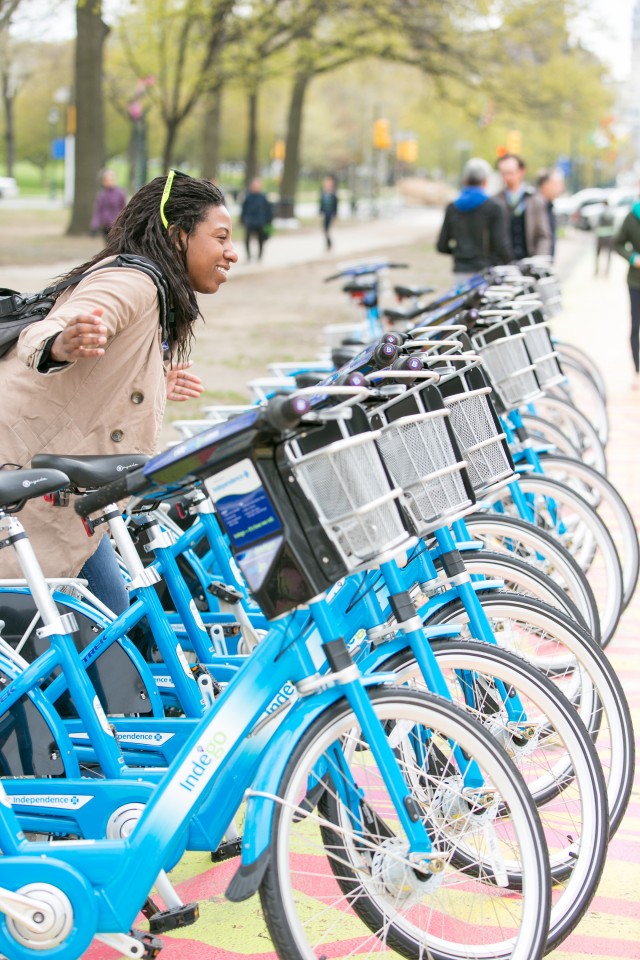Philadelphia outreach team reflects the neighborhoods they are trying to reach
by April Corbin, PeopleForBikes equity writer
June 3, 2015
Response to the bike share station at Tasker and 22nd in South Philadelphia was immediate. Drivers slowed cars to a crawl. Passengers put down their smartphones. Pedestrians stopped to inspect. The question on the gawkers’ minds: What is that?
Kim Smith was right there with answers.
Smith is one of Indego’s bike share ambassadors, a handful of people hired by the Bicycle Coalition of Greater Philadelphia to increase awareness of and interest in bike share within communities, especially in underserved ones like Point Breeze.
On launch day, that job was pretty darn easy. The sudden appearance of a dozen shining blue bicycles on a high traffic intersection is naturally stirring up interest. But as time goes on and the novelty and newness of the system fades, Indego officials believe Smith and her peers will be crucial to bringing bike share to low-income and people of color in greater numbers than the industry norm.
While having a street team is common among bike share systems, BCGP is taking a two-tiered approach to outreach by hiring both street team members and community ambassadors. The former are five entry-level part-timers who attend events and do one-on-one outreach with people throughout the city. Meanwhile, ambassadors are geographically based community leaders who promote bike share in both direct ways like tabling and indirect ways like exploring partnerships. Altogether there will be 20 of these ambassadors, though only 10 have been hired so far.
In addition to increasing use of bike share, the idea behind the ambassador team is to introduce multiple ways for passionate community members to help spread the news about Indego. Not everyone who is passionate about bike share can commit to a 20-hour-a-week, entry-level street team position.
“It was important to us and our mission to be able to provide a stipend,” says Katie Monroe, the bike share outreach manager at BCGP. “We didn’t want to just ask them to do all this work for us.”
Smith is a 48-year-old mother who was already active within her South Philadelphia community, and she’s happy there was a way for her to get involved beyond just spreading the word as a citizen.
“I’ve been promoting bike share since I first heard about it, even before I considered becoming an ambassador,” she says. “I think it’s positive for the community. My interest is bridging the gaps in the community. We have a lot of new residents and older residents. The older residents don’t bike. I think this can bring us together. Also, it’s another resource for the community.”
Smith counts herself as one of those residents who previously hadn’t ridden a bicycle in years. Through BCGP and Indego, she has been reintroduced to bicycles and learned how to safely ride on the street. All that helps her relate to people within the community. She knows exactly what their hesitations are.
“When I learned how to ride a bike, we rode against traffic,” she explains. “It feels easier to ride and see what’s coming, but I’ve been learning the rules.”
Words on the street
Upon hearing that the bike share station a few feet from her business now had bicycles docked there, Wendy Jacovic peeked out the door on launch day and nodded with approval.
“It’s a very good idea,” she says. “People want to be healthy.”
Jacovic, along with her husband, owns a Balkan restaurant, hardware store and rental units within a stone’s throw from an Indego station in the Graduate Hospital neighborhood of South Philadelphia. They’d seen Indego mentioned on the morning news but didn’t know much about it. Still, she had a general positive response to it.
“I think these bikes will be welcomed,” she concludes, before adding that she doesn’t think she’ll try one out because she isn’t comfortable riding in a city environment.
Nervousness about safety is a common hesitation potential users express about bike share, say Indego street team members and ambassadors. Others include worries that docks won’t be available where they need them, and feeling like the system would be redundant in their lives because they already own a bicycle.
Erasto Perez, another Indego ambassador, says many of these can be overcome with some explanation.
“I tell them they don’t have to worry about if they forget their lock at home, or they don’t have to worry about bringing their bike in and out of their living room,” he says. “It’s just another option. They like they flexibility, because bicycles are a necessity for many people here.”
Perez adds, “Maybe they won’t run out and sign up for a membership after that, but in a few months, maybe they will be a member.”
Chilon Carroll, a street team member who arrived at Indego via a recommendation by the local workforce development program PowerCorps PHL, echoes this.
“Sometimes it takes a while for people to warm up,” she says. “I don’t mind teaching out two, three times. That’s what it takes.”
The Better Bike Share Partnership is a JPB Foundation-funded collaboration between the City of Philadelphia, the Bicycle Coalition of Greater Philadelphia, the National Association of City Transportation Officials (NACTO) and the PeopleForBikes Foundation to build equitable and replicable bike share systems. Follow us on Facebook, Twitter and Instagram or sign up for our weekly newsletter. Story tip? Write april@peopleforbikes.org

